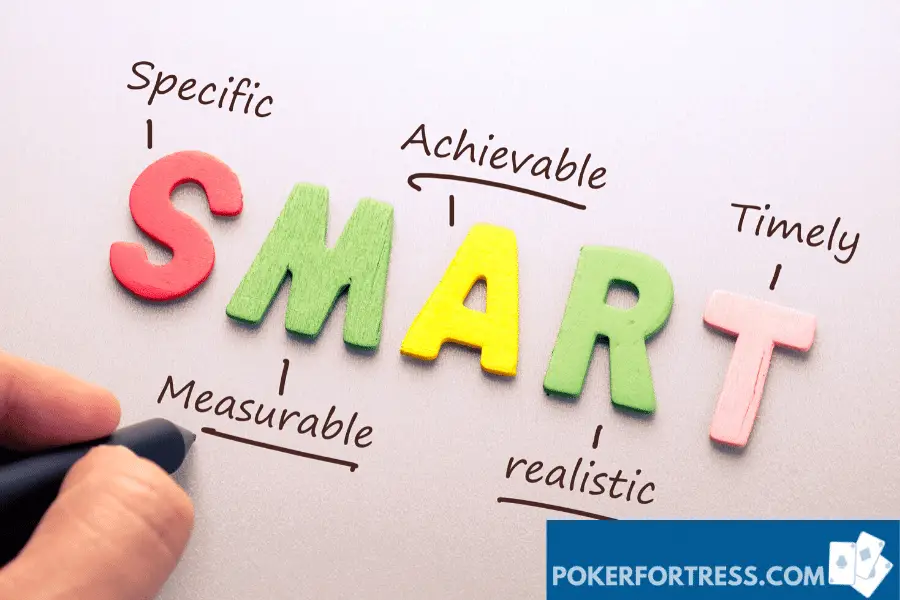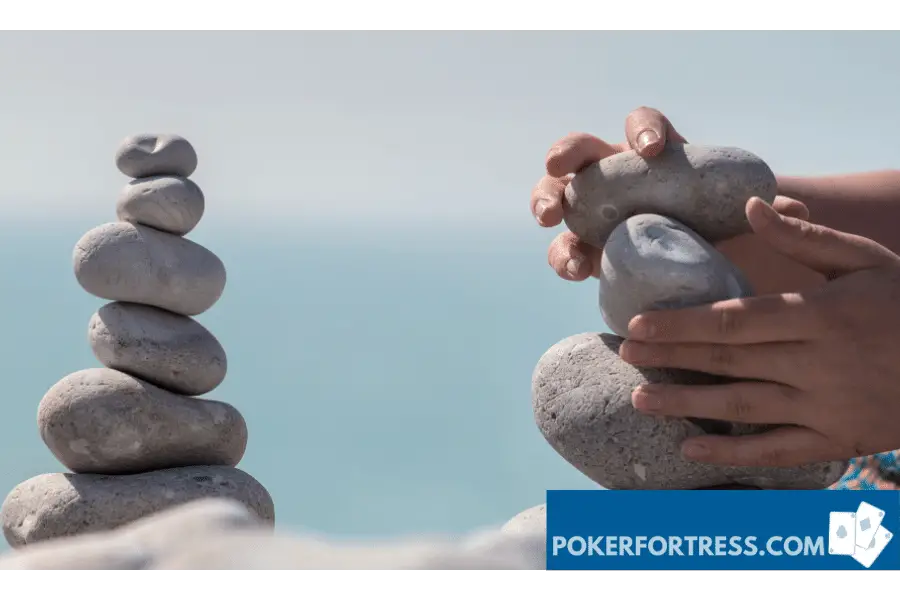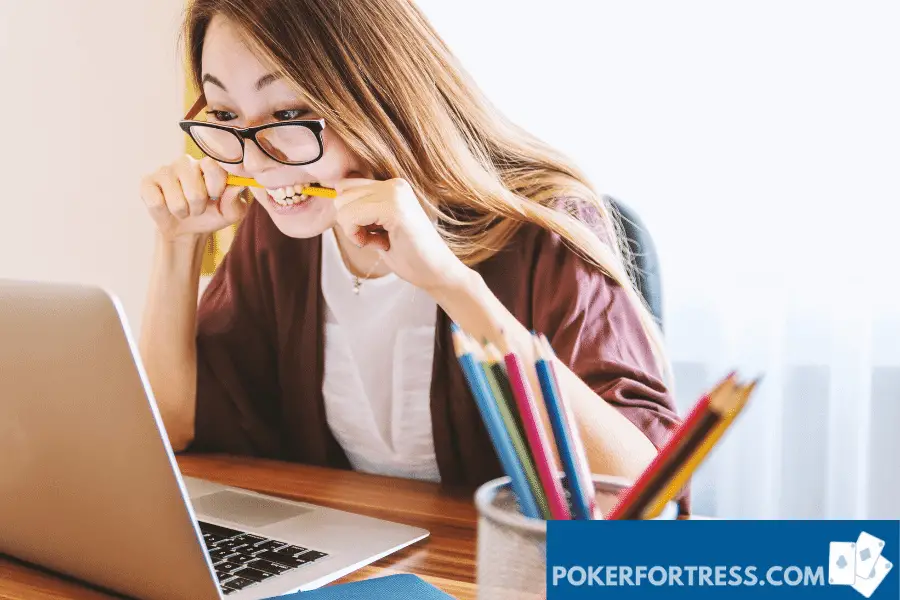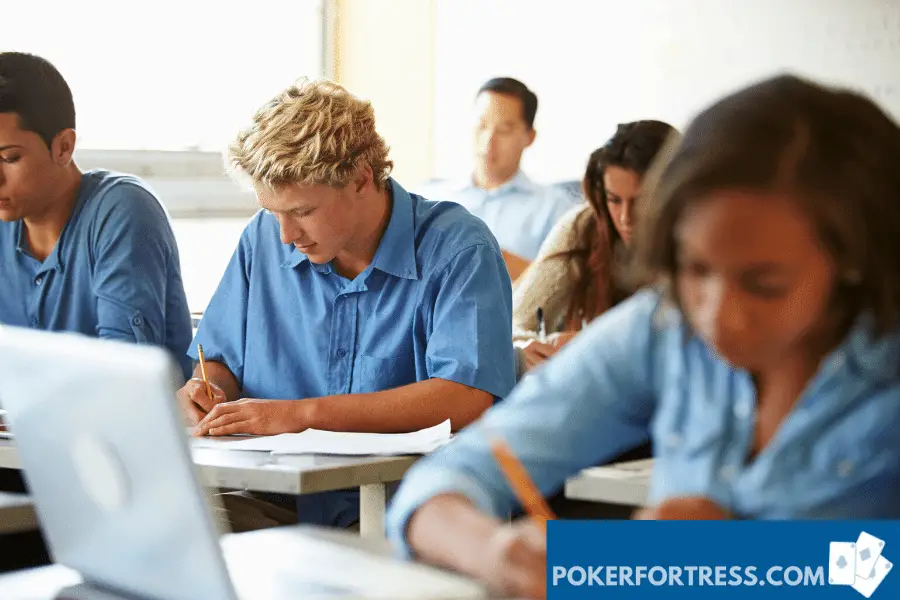When most people play poker, improving the way their mind works is possibly the last thing on their heads. Yet, it has been proven that poker can improve people’s mental focus and cognitive skills. If you’re looking for a good excuse to play more poker, here are 12 ways it makes you smarter.

Ways poker makes you smarter? Poker helps make you smarter in a lot of ways. Firstly, It helps build mental focus. The more you play the game, the better your mental alertness and awareness. While playing on a poker table, a lot is going on. Players are trying to figure out their best move, read opponents, and figure out the best strategy to play their hand. With all that mental work going on, it stimulates the brain and acts as a form of mental exercise that can help strengthen your mind.
Not many people give poker as much credit for improving intelligence as they give to games like chess. Whether you’re a student, investor, lawyer, or athlete, there are several ways poker can help make you a better professional and an overall better person.
13 Ways Poker Makes You Smarter
1. It Improves Logical Thinking

Many people make life-altering decisions based on their emotions or intuition. More often than not, these decisions don’t always end up well. While people believe ”follow your heart” is a piece of great advice, a poker player would know better.
Poker pushes you right to the edge of logical decisions.
You know you’re one move away from losing a hand, and you’re sure your opponents have already formulated strategies to out-think you. As such, you have no choice but to come up with the most logical move in the situation you’re in. Poker players always weigh their options and determine if the pros are greater than the cons.
A poker player doesn’t just make a raise because he/she feels like it.
He doesn’t simply fold because he’s scared. He takes these decisions based on the facts available to him. He thinks, ‘I’m holding a premium hand, I’ll be better off raising preflop with this hand.’
With players having to deal with lots of scenarios where they need sound logic to bail them out, they can improve their logical thinking immensely.
2. Developing Patience
It might seem odd, but patience is a smart people thing.
The ability to wait till the time is right is one ability most people don’t have. Most of us have been in that one situation where we wished we had waited just a little longer before we made a decision or said something.

Luckily for poker players, patience is a skill all players are required to have if they must become successful. When poker players fold hands, they aren’t too worried about the pot they’re going to lose. Another opportunity, another hand with better odds of them winning is undoubtedly going to present itself.
The best thing to do is wait for that opportunity instead of throwing your money away on average or completely worthless hands. Poker players face this scenario all the time, and the more they train themselves to be patient and calculative, the better decisions they make both on the poker table and in life.
3. It Instils Discipline

One of the smartest things to do in life is to cultivate the habit of self-discipline.
Whether it’s in saving for a new car, staying on a weight-loss routine, you need the discipline to stay on track. If you’ve ever tried to break free from a habit, you’ll understand how hard it is to remain disciplined.
For regular poker players, it can be successfully argued that they have an edge. Poker enhances discipline as players are faced with situations that test their resolve all the time.
One thing poker teaches you is to learn to keep your cool even when things are going against you. It takes discipline to play with your head when you’re on a losing streak.
When gambling, people tend to panic when they lose and try to win back their money quickly, even when the odds are against them. It is in this process they end up losing all they have. In poker, no matter how much you lose, you learn to keep your emotions in check and not allow it to affect your decision making or overall tactics.
4. It Helps to Deal With Loss
If you’re a poker player, losing is something you’re familiar with.

No matter how good you’re, there will be days when things won’t go your way. When you play regularly, you start to see losing as a normal phase, you’ll need to deal with at some point.
This mentality can heavily impact how you cope with failure in life. Just like losing a hand in poker, losing in life is inevitable. Sometimes, you’ll succeed, and other times you’ll fall short.
The trick is to learn to accept failure, learn from it, and get better. This is what poker players do. Smart players take losses in good faith, go back home, and analyze why they lost and how they can adjust their strategy to prevent future occurrences.
The most successful people on earth today will tell you stories of how they failed different times before they could succeed; the same goes for successful poker players. Every loss is an opportunity to learn and get better.
5. It Improves Concentration

Many people underestimate the power of concentration, but it’s often the difference between success and failure. In sports, athletes work extremely hard to keep their concentration levels to avoid making costly mistakes. It’s the same for every other task.
Keeping your eyes on the prize is the best way to get to the finish line, and it just so happens that playing poker can help you improve this. Poker is a game that demands a lot of mental work as you continuously try to analyze your opponents, their moves, and how best to play your hand.
Without optimum concentration levels, you can easily be knocked off your perch by opponents or make one mistake that could cost you the pot. The more you play poker, the better you become at keeping your head in the right place.
6. Risk Assessment
No matter how good a player you are, poker is all about taking risks and hoping your gamble pays off. The good thing is that your choices can influence how often your moves pay off or how often they don’t.
For example, if you’re facing a shaky opponent, going all-in with two pairs is not such a bad idea. Yet, if you don’t have a heart and there are 4 hearts on the table, betting doesn’t seem like such a bright idea. This formula is employed in your daily life, especially if you’re a businessman or woman.
Just like poker, business is all about taking calculated risks and hoping they pay off. With the knowledge of risk assessment in poker, you’re able to make better choices and go for opportunities that are dead certain to turn out well.
7. Read People Better
Humans are complex beings who can be extremely difficult to deal with. To relate with people, you need to understand them on a different level. Read their actions, gestures, and facial expression to find out the information they ordinarily wouldn’t readily give away.
This skill is essential for business persons and leaders who have to deal with different people on a daily. If you’re to tell if a person is being dishonest or not, you must master the art of reading people.
Luckily, poker is a great platform to learn how to read people.
Poker players try to read each other all the time. They understand both physical and emotional tells to determine what their opponent is thinking.
The more you play poker, the better you’d become at reading people.
In a world where everyone is trying to keep a secret, the ability to read people will always come in handy at some point.
8. It Promotes Optimism
Over the years, we’ve heard some of the smartest people in the world say you need to believe in your abilities if you’re to succeed. However you choose to look at it, they’re entirely right.
Pessimism will stop you from trying again. It puts fear in your heart and prevents you from taking risks.
Unfortunately, the fewer opportunities you take, the less likely you’re to succeed. This is common knowledge for poker players. It doesn’t matter how many times they fail; they know it only takes one hand to get back to winning ways. Poker teaches you to stay positive, never to stop believing, no matter how often you fail.
Every winning player was once a loser. For every hand you win, there’s a chance you’ve lost out of 3. If you’re not successful in this hand, there’s another opportunity in the next.
9. Coping Under Pressure

No matter how smart you are, if you don’t learn to handle pressure, there’s a chance you’d fumble the simplest of tasks. The pressure is one enemy people have to confront on a daily. Some can thrive under it, while others crumble entirely.
The ability to thrive under pressure is one of the hallmarks of smart people. For poker players, the pressure is no stranger.
In fact, one of the lessons you learn as a beginner poker player is making correct decisions under pressure. This is especially true for players who play in tournaments where they use short clocks. With just under a minute to make a decision that could win or cost you a huge pot, you’re bound to be under heavy pressure. This is why poker is the perfect game to help you deal with pressure a lot easier.
10. Develop a Poker Face
Sometimes, you don’t want to give away too much. You want to keep your true intentions a mystery to give you the upper hand in a tight situation or when negotiating a business deal. As the name suggests, a poker face is a term coined by poker players. As the battle of who can get the best tells unfolds, players try as much as they can to keep a straight face.
You try not to react to whatever action is happening on the table. Whether you’re dealt a weak or strong hand, the success of your strategy is built upon the element of surprise.
The less your opponent knows about your hand, the better your chances of outplaying them. Poker invokes a lot of emotion. You can feel excited at being dealt a strong hand, anxious as to what your opponent holds or disappointed at a wrong decision.
Yet, these emotions need to be masked to ensure you don’t give away vital information to your opponent.
A great poker face can be incredibly helpful when you’re trying to be discreet about your dealings. Hiding essential details from the public while negotiating a deal can help keep your competitors from hijacking it.
11. Boosting Mental Math

It can be argued that many poker players don’t quite fancy the math in the game. Their position is reaffirmed by the fact that players can become successful in poker by relying on nothing else but their intuition. Yet, the facts state that the best poker players out there are the men and women who have their math right.
Players often count cards on the table and in the hands of their opponents to help rule out certain possibilities and make better decisions. Whether you’re calculating pot odds or bluffing success, a little math can help you decide whether you should make that play or not. Every opportunity to practice mental math is always a big boost.
Your mental math could come in handy when you’re taking a loan, closing a trade or negotiating salaries.
12. Bankroll Management
Being smart is all about making the right decisions, making better life choices, and doing things in a way that gives you a better chance to succeed. One such smart decision is managing your bankroll. It entails planning a budget, sticking to it, and tracking your profit and loss accurately.
Some of the wealthiest people in the world can remain rich by hiring a bunch of financial advisors to help keep their finances in check.
No matter how rich you are, if you keep spending everything you earn, you’ll never be able to save any profits. Poker teaches players to keep a strict bankroll. Before going into a game, players already know how much they can afford to bet and lose.
This is what differentiates a professional poker player from the random guy who gambles all his money away. If you want to learn how to manage your finances, poker will prove to be a great help.
13. It Improves Your Study Culture
One of the biggest challenges most people face is establishing a reading culture. This is especially true for students. No matter how hard you try, sometimes you just don’t have that urge to study.
Then again, once you start and get in the groove, you feel that urge to always study. For some people, this urge comes and goes. For others, it is permanent, and that’s because they have established reading culture overtime.
Learning to play poker is a great way to establish your study culture.
Beginner poker players always have their work cut out for them. They must first learn the basics of the game and continue to learn how to take their game to the next level.
This learning process usually requires studying poker books, watching videos(free coaching material), and taking lessons from poker coaches. This learning process can help build a study culture and ensure you’re always in the mood to study.
Other Ways Poker Improves You

Apart from making you a smarter person, there are different ways poker improves your overall lifestyle. These are intelligent tweaks that could help you lead a better life in general. They are:
- Dealing With Stress: One of the things that could reduce your life expectancy is stress. With work, life, and loved ones to worry about, you can easily break down if you don’t learn how to manage your time and find a balance. If you’re a poker player, one thing you can’t deny is that poker can be quite stressful.
This is especially true for professional players who engage in several intense poker sessions throughout the year. With the stress that comes with the game, players are forced to create time to relax and unwind.
Otherwise, a breakdown is on the cards. Poker players know that they have to be in peak physical and mental state to play at their best.
They know that managing stress is not a luxury; it is key to their overall performance. The same goes for everyone. You make better life choices, perform better at work, and lead a much better life when you’re less stressed. This is why it is vital to find a balance.
- Adjusting to Change: We’re living in an age where things are changing fast thanks to considerable advancements in technology. Sometimes, it can be hard to keep up.
Being unresponsive to change can cost you. Whether it’s at work or in your relationship with people, you need to develop the ability to react and quickly adjust to evolving conditions. Poker is a game that can change very quickly.
One card can suddenly turn a rubbish hand like four-flush into a strong hand. In that case, everyone at the table would have to adjust their strategy and rethink their moves. Also, you can be in a terrible position like the small blind, and soon enough, you’re in a great position like the button.
In each of these positions, you need different strategies to get by. This means poker players need to be flexible to achieve sustainable success in the game. Playing poker gives you the impetus to develop a habit of adjusting quickly to different situations in life.
- Dealing With Competition: Despite what motivational speakers say about life not being a competition, you’ll be faced with daily challenges that present strong competition. At work, at school, or renting a good apartment.
While some people are able to deal with competition, others are simply not prepared for the heat.
This usually results in avoidable conflicts. When you play hundreds of hands against 9, 10 players every week, you get used to the competition. Poker teaches you that competition can be healthy. Squaring up against other individuals can sometimes bring the best out of us.
Many people take competition personally, but poker players know better. Today you lose your money to a better opponent, but tomorrow you’re winning against people too. You learn to appreciate opposition and thrive in an environment with fierce competition.
- It Changes Your Perception About Life: There are several life lessons you can learn while playing poker. Whether you’re learning how to tell if a person is bluffing or learning to cope with loss, poker teaches you more lessons than any game you can think of. Ultimately, playing poker can change the way you see the world and the people around you.
With hours spent trying to topple opponents by any legal means necessary, poker can completely change your personality. You’re less frivolous with your spending, more skeptical of people’s true intentions, and less worried about the setbacks you suffer in life.
- Make More Friends: If you play cash games regularly, you’re going to play against several persons, and there’s a chance some of them can become your friends along the way.
While some poker players prefer to remain quiet and even plug on their earphones to block out the conversation going on during a hand, there’s no harm in engaging in friendly banters with your opponent.
Sometimes, you can meet a person you click with instantly, while other times, you can play against certain opponents so frequently that you grow fond of them. Either way, don’t rule out the chance of meeting a good friend while playing poker.
Can Poker Make you Perform Better at School?

While I’m not sure how much of this is true in reality, I can say a firm yes to it in theory. Everything I’ve said so far in this article supports the notion that poker makes people smarter. If that’s the case, it should also help you perform better at school. There are many reasons why people struggle at school. Sometimes, it’s because they find it difficult to concentrate in class. This is one problem that poker can help fix.
I mentioned earlier that poker is a game that demands high concentration levels to process everything that’s going on around the table. The more poker you play, the better your concentration becomes, and this can help you improve in your academics.
With lots of thought put into every move, poker is a great tool for brain exercises. This works to improve mental alertness and mental focus.
Experts say that the brain is just like our muscles. The more exercises you do, the fitter and more active you become. In the same vein, the more brain exercises you do, the sharper your brain becomes. Whether it’s improving memory retention or faster processing, poker provides the right type of brain exercise to keep you sharp and super intelligent.
Should Poker Be Introduced at School?
While it’s true that poker can help students become better in their academics, it’s still very much viewed as gambling. Although there are ways poker can be played without using real money, it’s unlikely that school authorities would want to integrate a casino game in the school curriculum. This may change if the game can manage to change its reputation, but for now, you won’t be seeing poker played at school.
Also, other games help develop a student’s cognitive abilities that aren’t necessarily related to gambling. Games like Chess(Wikipedia) and scrabble(Wikipedia) are already being integrated to help students improve their cognitive skills. This means it would take a bit of a miracle to see poker being allowed in schools.
If you’re a student and wish to boost your intelligence by playing poker, there are several online poker sites that would be happy to welcome you to their fold. Also, you can organize poker games amongst friends who are also poker enthusiasts. Whatever you do, just don’t bring poker to school.
Final Thoughts
There you have it. Poker is more than just another gambler’s delight. Apart from the enormous profits, you can make from this game, it can also help improve your life in general.
It’s safe to say that the more poker you play, the smarter you become. Whether you’re playing online poker or live cash games, there’s so much you can learn to keep your brain sharp.
Although it may sound too good to be true that poker can do much as this article suggest, the reality says otherwise. It is, therefore, not a surprise that the game has remained popular ever since it was developed in the 19th century. So, if you’re just starting your journey and looking for a good excuse to keep playing poker, there’s plenty to take away from this article.



